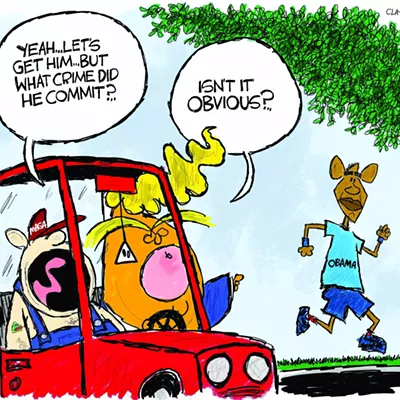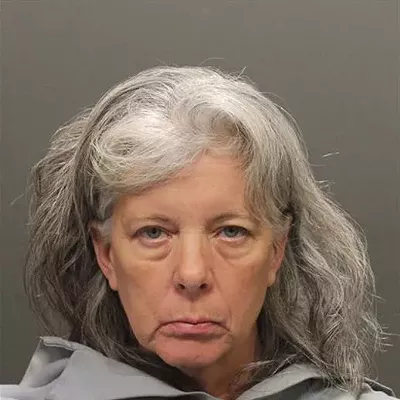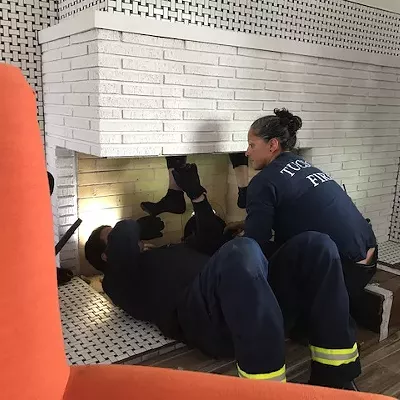Fearing retaliation by sympathizers of the suspected killer, Jonathan asked that his last name and the details of his current whereabouts not be used in this story. He's not only gay, but Jewish--a double whammy, he said.
Talking over the phone from the East Coast apartment he just moved into, he gives the impression that he's a realist, a self-assured man who, at 48, has the means and experience needed to overcome life's most savage moments.
But when asked about the days following Walsted's murder, Jonathan's voice, normally resounding with conviction, trails off as if his throat has tightened. It brings back painful memories and a wave of anger.
"Initially, there was this terrible void, and I sought to fill it," he recalled. "Here was this guy who was in my life all the time. We got up together; we spent every minute together. I didn't know what to do.
"He (the accused murderer) was out there with a baseball bat, and he wanted to fuck someone up good," Jonathan said. "And unfortunately, Philip was the one."
Tucson is sometimes thought of as a progressive island drifting in Arizona's conservative seas. Pima County has about 30,000 more registered Democrats than Republicans, and Tucson was the first city in the state to start a domestic partnership registry. But to many people who knew Walsted--or know of him now that he's gone--his death serves as a reminder that anti-gay murders aren't tragedies confined to Wyoming.
FBI statistics say 1,500 hate crimes against gays were recorded nationally in 2002. In the same year, 27 incidents were reported in Tucson, according to Detective Tim Rupel, Tucson Police Department's hate crimes investigator.
While Tucson hate crime numbers have generally declined--from 49 reported cases in 2001 to 20 so far (as of our press deadline) this year--Rupel said the statistics reflect only a small portion of what's going on.
"One thing you can say about hate crimes is that statistics show us only one of every eight hate crimes is reported," Rupel said.
He cited many reasons for this, including "disbelief that something like this still occurs," fear of retaliation and victims not wanting it publicly known that they're gay.
The statistics don't mean much because of all this, according to Lori Girshick, anti-violence project coordinator for Wingspan, a LGBT community center. She said that many gays and lesbians, "for historical or current reasons, do not trust the legal system and are wary of talking to police.
"For every person who comes forward, who knows how many people don't?" Girshick asked. "We'll never know the full extent, but I'm sure it's a lot more than we're aware of. I don't think numbers tell you anything."
It's not just physical violence that's an issue, according to Girshick. Gays are routinely harassed and threatened or have their property damaged, for example.
"It's not the hate crime like a murder, but these kinds of hate crimes that are happening are threatening, they are illegal and they lead the victim to be apprehensive," she said. "Even though these things aren't reported to the police because there's not an injury, emotionally, there's an injury."
Every so often, a homosexual is seriously attacked in Tucson, causing fear and anger in the gay community. But Walsted is the only known person who has died as a result of the assaults.
In January 2000, Gary Grayson stabbed a gay man on Fourth Avenue while reportedly shouting "killing a fucking faggot." The victim's wounds were non-life-threatening, and Grayson was quickly apprehended.
Mark Fontes was assaulted outside gay bar IBT's, 616 N. Fourth Ave., in January of this year. Although police have yet to label it a hate crime, a crowd at a vigil held for Fontes shortly after the attack seemed convinced he was targeted because he is gay. While no arrests have been made in the case, Fontes has since recovered (and he has declined interview requests from the Weekly).
As for Walsted's murder, David Augustine Higdon, 22, is scheduled to stand trial Jan. 11 on first-degree murder and armed robbery charges in connection with his death.
Trial delays and claims that Higdon and four other men formed a Neo-Nazi criminal syndicate while in prison have drawn out the process. Higdon turned down a plea bargain at a September hearing; he could have received a 22-year prison sentence on a second-degree murder charge, in exchange for a guilty plea.
He could face life in prison if convicted of first-degree murder.
Higdon has been in trouble with the law throughout his life. Court records show he was charged with possession of marijuana in 2000 and aggravated assault in 1998 and 2004.
Higdon has described himself to local media as a "white separatist," saying his views don't apply to gays, just races. His name appears on a white-supremacy Web site called White Revolution under its "POW Outreach" list of individuals in apparent police custody.
The Web site, which features advertisements for white-supremacist business cards and warns white children of the dangers of trick-or-treating in non-white neighborhoods, asks for monetary or emotional support for the names listed, because they have made "sacrifices ... in the struggle for the survival of our people."
"If you are a white man or woman who is a non-drug using heterosexual and you care about the future of our race, then you are already one of us, whether you know it or not," the White Revolution mission statement says.
The police report for the murder, which is hundreds of pages thick, describes what the only known witness said she saw on June 12, 2002. It contains a statement from Higdon's friend, Kathleen Farabaugh, who accompanied him that night.
Police believe Walsted stepped out of the house he and his partner shared at 910 N. Fourth Ave., shortly after midnight. According to Jonathan, it was not uncommon for Walsted to take a walk among the shuttered bars, restaurants and old homes after his late shift as an American Airlines reservationist.
At around 2 a.m., authorities say, Higdon, who was parked near Roskruge Bilingual Magnet Middle and Elementary School with Farabaugh, called out to Walsted. The two are believed to have chatted for a few moments, possibly sharing a joint in the bed of Higdon's truck.
Farabaugh said during her police interview that she got back into the truck's cab and listened to music while they talked. Then she claimed she felt the vehicle shake and turned around to see Higdon pummeling Walsted with an aluminum bat. Higdon screamed at Walsted not to talk to him as the blows continued, she said.
Walsted--a slightly built man at 5-feet-6-inches--fled, but Higdon--5 inches taller and bulkier at 200 pounds--overtook him after running around a corner, Farabaugh continued.
"And I could hear (Higdon) yelling and yelling," she sobbed, as she relayed events to police. "And I could hear the bat hitting the kid over and over."
Farabaugh said Higdon also repeatedly kicked Walsted. He later washed his shoes, but the laces were still stained red, she told police.
After the beating, police alleged that Higdon took Walsted's shoes, driver license, keys and other items of value. According to Farabaugh, Walsted didn't have a wallet, so Higdon thought he might have money in his shoe. Authorities reportedly found the victim's license and keys at Higdon's home after they obtained a search warrant.
Walsted, his face swollen beyond recognition, was spotted in a pool of blood in the middle of the road at Hoff Avenue and Fifth Street at around 4:50 a.m. He was taken to a hospital and pronounced dead several hours later. At least two of the blows penetrated his skull, an autopsy showed.
About one week later, authorities nabbed Higdon during a search of his home.
Higdon turned down a Weekly request for an interview, and his public defender, Bobbi Anne Berry, did not return three phone calls seeking comment.
Despite the gruesome nature of Walsted's death, the murder wasn't as big a story as some might expect. Paul Kohn, 40, was a friend of Walsted's. He believes that not classifying the murder as a hate crime immediately left the gay community in limbo.
"The way in which it was not originally classified as a hate crime says something about our judicial and penal system," he said. "What I feel is that the way the crime was treated here suggests to me that the people who run the show here in Tucson don't think gays and Jews and blacks can be the victims of such crimes."
Kohn also expressed frustration that prosecutors were not pursuing the death penalty.
Citing ethics rules, a Pima County Attorney's Office spokesman declined to talk about the case while it is in the pre-trial phase.
Walsted "had his life ahead of him" and deserved more, Kohn said. He had just opened his eyes to all the possibilities ahead of him and mended family relationships strained due his homosexuality, he added. Things were falling into place, and then all that potential was lost.
In June 2004, more than 100 people attended a memorial vigil to recall Walsted's life and the struggle to end hate crimes against homosexuals. Wingspan's Girshick said memory and education are potent tools in combating anti-gay sentiment.
"One of the most important things is not forgetting Philip, not forgetting anyone who's the fatal victim of hate," she said. "The more people we can talk to and provide a forum for them to ask questions, the better. All of that is part of the solution."
Jonathan wants people to know about Walsted, not only to help find that solution, but also to honor the man he loved. A friendly, "chatty" person, Walsted "never had a hair out of place" and liked to keep things "light and airy," he said.
"He could get through his life without me," Jonathan recalled about his partner's fierce sense of independence. "He wasn't there because he needed me; he was there because he wanted to be.
"We were struggling together; it was a good thing," he continued. "He was a diamond in the rough. I expected to spend my whole life with him."










